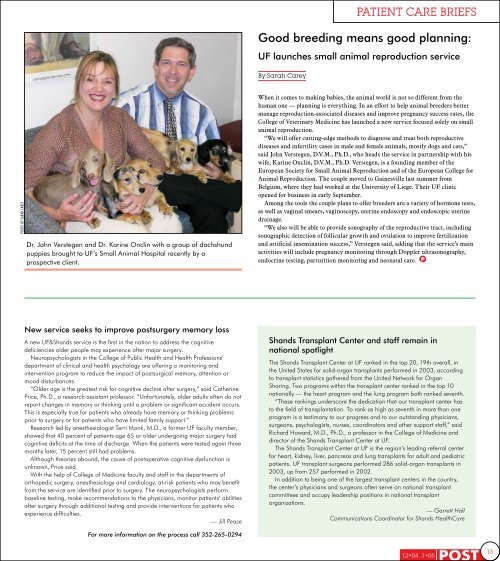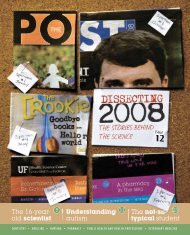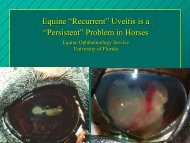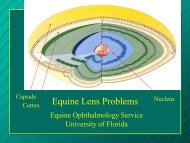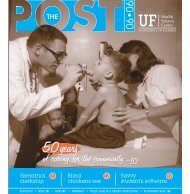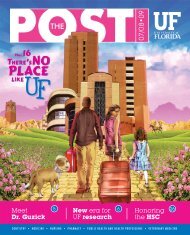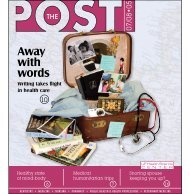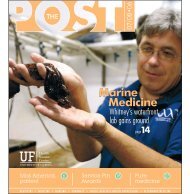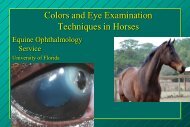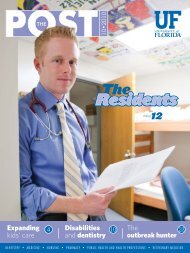Simulation Center - UF Health Podcasts - University of Florida
Simulation Center - UF Health Podcasts - University of Florida
Simulation Center - UF Health Podcasts - University of Florida
You also want an ePaper? Increase the reach of your titles
YUMPU automatically turns print PDFs into web optimized ePapers that Google loves.
patient care briefs<br />
Good breeding means good planning:<br />
<strong>UF</strong> launches small animal reproduction service<br />
By Sarah Carey<br />
Photo By Sarah Carey<br />
Dr. John Verstegen and Dr. Karine Onclin with a group <strong>of</strong> dachshund<br />
puppies brought to <strong>UF</strong>’s Small Animal Hospital recently by a<br />
prospective client.<br />
When it comes to making babies, the animal world is not so different from the<br />
human one — planning is everything. In an effort to help animal breeders better<br />
manage reproduction-associated diseases and improve pregnancy success rates, the<br />
College <strong>of</strong> Veterinary Medicine has launched a new service focused solely on small<br />
animal reproduction.<br />
“We will <strong>of</strong>fer cutting-edge methods to diagnose and treat both reproductive<br />
diseases and infertility cases in male and female animals, mostly dogs and cats,”<br />
said John Verstegen, D.V.M., Ph.D., who heads the service in partnership with his<br />
wife, Karine Onclin, D.V.M., Ph.D. Verstegen, is a founding member <strong>of</strong> the<br />
European Society for Small Animal Reproduction and <strong>of</strong> the European College for<br />
Animal Reproduction. The couple moved to Gainesville last summer from<br />
Belgium, where they had worked at the <strong>University</strong> <strong>of</strong> Liege. Their <strong>UF</strong> clinic<br />
opened for business in early September.<br />
Among the tools the couple plans to <strong>of</strong>fer breeders are a variety <strong>of</strong> hormone tests,<br />
as well as vaginal smears, vaginoscopy, uterine endoscopy and endoscopic uterine<br />
drainage.<br />
“We also will be able to provide sonography <strong>of</strong> the reproductive tract, including<br />
sonographic detection <strong>of</strong> follicular growth and ovulation to improve fertilization<br />
and artificial insemination success,” Verstegen said, adding that the service’s main<br />
activities will include pregnancy monitoring through Doppler ultrasonography,<br />
endocrine testing, parturition monitoring and neonatal care. P<br />
New service seeks to improve postsurgery memory loss<br />
A new <strong>UF</strong>&Shands service is the first in the nation to address the cognitive<br />
deficiencies older people may experience after major surgery.<br />
Neuropsychologists in the College <strong>of</strong> Public <strong>Health</strong> and <strong>Health</strong> Pr<strong>of</strong>essions’<br />
department <strong>of</strong> clinical and health psychology are <strong>of</strong>fering a monitoring and<br />
intervention program to reduce the impact <strong>of</strong> postsurgical memory, attention or<br />
mood disturbances.<br />
“Older age is the greatest risk for cognitive decline after surgery,” said Catherine<br />
Price, Ph.D., a research assistant pr<strong>of</strong>essor. “Unfortunately, older adults <strong>of</strong>ten do not<br />
report changes in memory or thinking until a problem or significant accident occurs.<br />
This is especially true for patients who already have memory or thinking problems<br />
prior to surgery or for patients who have limited family support.”<br />
Research led by anesthesiologist Terri Monk, M.D., a former <strong>UF</strong> faculty member,<br />
showed that 40 percent <strong>of</strong> patients age 65 or older undergoing major surgery had<br />
cognitive deficits at the time <strong>of</strong> discharge. When the patients were tested again three<br />
months later, 15 percent still had problems.<br />
Although theories abound, the cause <strong>of</strong> postoperative cognitive dysfunction is<br />
unknown, Price said.<br />
With the help <strong>of</strong> College <strong>of</strong> Medicine faculty and staff in the departments <strong>of</strong><br />
orthopedic surgery, anesthesiology and cardiology, at-risk patients who may benefit<br />
from the service are identified prior to surgery. The neuropsychologists perform<br />
baseline testing, make recommendations to the physicians, monitor patients’ abilities<br />
after surgery through additional testing and provide interventions for patients who<br />
experience difficulties.<br />
— Jill Pease<br />
Shands Transplant <strong>Center</strong> and staff remain in<br />
national spotlight<br />
The Shands Transplant <strong>Center</strong> at <strong>UF</strong> ranked in the top 20, 19th overall, in<br />
the United States for solid-organ transplants performed in 2003, according<br />
to transplant statistics gathered from the United Network for Organ<br />
Sharing. Two programs within the transplant center ranked in the top 10<br />
nationally — the heart program and the lung program both ranked seventh.<br />
“These rankings underscore the dedication that our transplant center has<br />
to the field <strong>of</strong> transplantation. To rank as high as seventh in more than one<br />
program is a testimony to our progress and to our outstanding physicians,<br />
surgeons, psychologists, nurses, coordinators and other support staff,” said<br />
Richard Howard, M.D., Ph.D., a pr<strong>of</strong>essor in the College <strong>of</strong> Medicine and<br />
director <strong>of</strong> the Shands Transplant <strong>Center</strong> at <strong>UF</strong>.<br />
The Shands Transplant <strong>Center</strong> at <strong>UF</strong> is the region’s leading referral center<br />
for heart, kidney, liver, pancreas and lung transplants for adult and pediatric<br />
patients. <strong>UF</strong> transplant surgeons performed 286 solid-organ transplants in<br />
2003, up from 257 performed in 2002.<br />
In addition to being one <strong>of</strong> the largest transplant centers in the country,<br />
the center’s physicians and surgeons <strong>of</strong>ten serve on national transplant<br />
committees and occupy leadership positions in national transplant<br />
organizations.<br />
— Garrett Hall<br />
Communications Coordinator for Shands <strong>Health</strong>Care<br />
For more information on the process call 352-265-0294<br />
12•04 1•05<br />
POST 13


